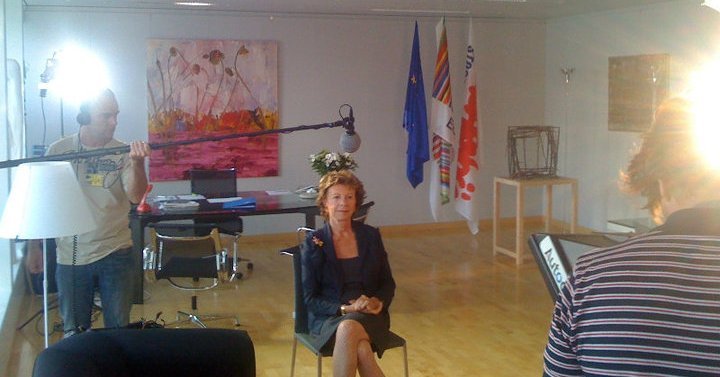Why is the European Commission interested in open data? Is data really « the new oil »?
The most interesting thing for the European Commission is that so much can de done with so little when it comes to data. Opening up data that is already collected, that taxpayers have already paid for, is right for transparency, and is the cheapest way we know to unlock innovation potential. It’s the best way we know to help Europeans create the jobs and economic growth that we so desperately need.
So yes, data really is the new oil. Data is a raw material for information businesses, just as oil is a raw material for fuel and plastics businesses. Data is also everywhere, it is cheap, and it can deliver huge rewards both in terms of services and financial returns.
New businesses can be built on the back of these data, on the new possibilities to analyse and visualise data from different sources. Open data is also a powerful instrument to build better services, because it increases the possibilities for evidence-based policy-making and making use of user-generated information. We see that through apps that augment publicly and privately-generated information like Wheelmap.org which helps the disabled navigate their communities, or apps in Estonia which allow users to photograph garbage in the street and send the geo-tagged images to their authorities to deal with. Environmental services and assessments could also be improved greatly.
2. What type of data do you want to open, and why? Is there room for some public data to remain un-opened in the future? And what about corporate data?
It’s for each EU member state to decide exactly what they want to release. There are obvious exceptions for commercially confidential information for example, or material that is subject to third-party copyright. And personal data such as information about your health is obviously exempt. But we are saying that public authorities should greatly increase the amount of data they release, and when they do make it available it has to be available on equal terms to all.
Business registers have been a source for many profitable new businesses over the past 20 years, and there are great transparency examples like OpenCorporates. Two other examples come from Denmark and France (which also launched data.gouv.fr in December 2011). The Danish Enterprise and Construction Authority (DECA) achieved a 10,000% increase in the number of users of their information when they lowered access charges. This created a market 10 times larger than the one that existed eight years, and the additional tax revenue from the economic activity this information generated is four times the reduction in income from fees.
The lowering of charges brings in new types of users, particularly SMEs. For example SIRCOM(the Communication Service of the French Ministry for the Economy, Finance and Industry) has been collecting data on fuel prices in France regularly. NAVX, a venture capital company active in the field of location-based services, acquired a license for commercial re-use of SIRCOM’s information and improved the information by keeping it more up to date, and more geographically precise. The enriched data are then used for the company’s own GPS and smart phone applications and are sold to NAVX’s sub-licensees. NAVX focuses on both the B2C business of selling its applications directly to end-users and on the B2B2C business of providing its enriched location-based content to GPS manufacturers, geo-information companies and mobile operators. Building on its strong home market in France, NAVX has been able to expand further to cover at least eight different European countries.
3. Did you measure the economic spillovers of the European open data strategy? Can you tell us more about these figures? Have you in mind to launch an econometric study to challenge your forecasts and lighten the stakeholders? The Commission used Graham Vickery who heads the Information Economy section of the OECD in Paris, and found really significant benefits. Today’s public sector information market is worth around 30 billion euros a years. But the overall economic gains from further opening up public sector information by allowing easy access are in the order of € 40 billion a year. But as Vickery has pointed out, it is the indirect gains that could be the most important, by making future innovation easier for example. If you include indirect benefits from opening this data the boost could be up to 140 billion euros per year. But we don’t know exactly what could happen and that’s a very good thing: we simply know that we you give people access to this data they do great things with it.
We would obviously be delighted if stakeholders could use open data itself to help us further measure the impacts! But for now the focus has to be on getting the culture change in public authorities and the legislation in place in Member States so that Europeans can see more of the benefits of opening up data in their daily lives.
4. How do you make sure that opening European public data does not only benefit to those who have the biggest capability to process it, that is the American giants? In other words: how do you build a European data industry that brings value, jobs and growth...in Europe?
The most important step is make information available on equal terms at marginal cost. For most data the cost will therefore be nothing or it will be very low. It is also important that potential users of data have a right of appeal if they think they are being charged unfairly. Re-users will have the right to appeal to an independent authority. In case of dispute over the charges, the burden to prove that the charges for re-use comply with the rules of the Directive will in the future be on the public body and not (as previously) on the re-user.
But we have to remember that open data is that is an enabler. The government can’t do all the work – we need data entrepreneurs to jump in and make the most of the opportunity. We are there to help but the real progress will be achieved not by me, but from people reading this article.


Follow the comments: |
|
